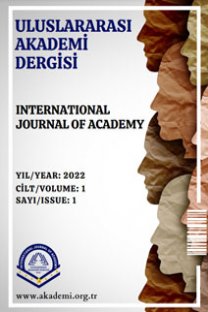İş Yerinde Hubris Sendromu ile Nasıl Başa Çıkılır?
Kibir, Yönetici Davranışı, Hubris Sendromu, Narsisizm, Aşırı Özgüven
How to Cope with Hubris Syndrome at Work?
Arrogance, Executive Behavior, Hubris Syndrome, Narcissism, Overconfidence,
___
Asad, S. & Sadler-Smith, E. (2020). Differentiating leader hubris and narcissism on the basis of power. Leadership, 16(1), 39-61.
Başkurt, B. B. & Demirci, Ş. D. (2022). Max Weber: Bureaucracy Theory and Accounting Approach. Süleyman Demirel Üniversitesi İktisadi ve İdari Bilimler Fakültesi Dergisi, 27(4), 675-693.
Beinart, P. (2010). The Icarus syndrome: A history of American hubris. Melbourne Univ. Publishing.
Berger, J., Osterloh, M., Rost, K. & Ehrmann, T. (2020). How to prevent leadership hubris? Comparing competitive selections, lotteries, and their combination. The Leadership Quarterly, 31(5), 1-17.
Biçer, C. (2021). The Icarus paradox in management: how to be a well-balanced leader?. Nevşehir Hacı Bektaş Veli Üniversitesi SBE Dergisi, 11(4), 1891-1905.
Council of Higher Education Thesis Center. (2023). (https://tez.yok.gov.tr/UlusalTezMerkezi/tezSorguSonucYeni.jsp).
Cudjoe, R. V., Grant, P. K. T. & Otchere, J. A. (2011). The fall of the tragic hero: A Critique of the “hubristic principle”. UJAH: Unizik Journal of Arts and Humanities, 12(1), 1-33.
Çiftci, D. Ö. (2020). Hubris syndrome in managers: A conceptual evaluation. Management Studies, 31(2), 176-194.
Diamandis, E. P. & Bouras, N. (2018). Hubris and sciences. F1000Research, 7, 133-137.
Eckhaus, E., & Sheaffer, Z. (2018). Managerial hubris detection: The case of Enron. Risk Management, 20, 304-325.
Eren, V. (2001). Yeni kamu yönetimi anlayışı: Büyükşehir ve il belediyeleri üzerinde bir araştırma (Doktora Tezi, Sakarya Universitesi).
Esen, Ü. B. (2020). Liderlikte kibir ve aşırı pozitiflik: Bir literatür incelemesi. İş ve İnsan Dergisi, 7(2), 295-309.
Faiz, N. (2013). Impact of manager’s reward power and coercive power on employee’s job satisfaction: A comparative study of public and private sector. International Journal of Management and Business Research, 3(4), 383-392.
Gabriel, Y. (1998). The hubris of management. Administrative Theory & Praxis, 257-273.
Garrard, P. (2018). Leadership hubris epidemic. Basingstoke: Palgrave Macmillan.
Gonzalez-Garcia, J. (2019). Hubris syndrome in neurosurgery. Revista de Neurologia, 68(8), 346-353.
Gökkaya, D. & Şenol, O. (2021). Yöneticilerin hubristik davranışlarının örgüt sağlığına yansımaları. R. Erdem & M. Yelsiz (Eds.), Yönetim Hastalıkları içinde (ss. 449-478). Siyasal Kitabevi.
Hidayati, H., Arifuddin, A., Aflina, A. & Dewi, R. S. (2021). Reality of hubris syndrome through Herman Melville’s novel Moby Dick. Journal of Language, 3(1), 1-10.
Khan, A., Raheem, F. & Naveed, F. S. (2023). The dark side of the entrepreneur personality and small medium enterprise performance through mediating role of hubris behavior: An empirical assessment. Multicultural Education, 9(4),42-53.
Karakaş, F., Kusan, M. & Germi, R. (2023). The relationship between mercy and hubris syndrome in athletes. International Journal of Education Technology And Scientific Researches, 8(24), 2377-2389.
Liapis, C. C. (2022). From ancient hatei to hubris syndrome in SARS-CoV-2 health crisis management. Psychiatria Danubina, 34(1), 111-115.
Loch, C. H. (2016). It’s not just others: Conquering the hubris in yourself. In The Intoxication of Power: Interdisciplinary Insights (pp. 101-115). London: Palgrave Macmillan UK.
Loia, F., de Gennaro, D. & Adinolfi, P. (2022). Managerial hubristic-behavioral strategy: how to cope with chaotic and uncertain contexts. Management Research Review, 45(9), 1137-1154.
Lunenburg, F. C. (2012). Power and leadership: An influence process. International Journal of Management, Business, and Administration, 15(1), 1-9.
Maltaş, E., Orhan, S., Gümüş, M. & Kızılkaya, E. (2021). Hubris syndrome: The danger of overassessing one’s status in a group. New Era International Journal of Interdisciplinary Social Researches, 6(9), 88-107.
Metin, O. & Ünal, Ş. (2022). İçerik analizi tekniği: İletişim bilimlerinde ve sosyolojide doktora tezlerinde kullanımı. Anadolu Üniversitesi Sosyal Bilimler Dergisi, 22(Özel Sayı 2), 273-294.
Miller, D. (1992). The Icarus paradox: How exceptional companies bring about their own downfall. Business Horizons, 35(1), 24-35.
Owen, D. (2008). Hubris syndrome. Clinical Medicine, 8(4), 428-432.
Owen, D. & Davidson, J. (2009). Hubris syndrome: An acquired personality disorder? A study of US Presidents and UK Prime Ministers over the last 100 years. Brain, 132(5), 1396- 1406.
Özbozkurt, O. B. (2019a). Çağdaş stratejik yönetim mimarisi üzerine. Avrasya Sosyal ve Ekonomi Araştırmaları Dergisi, 6(4), 67-81.
Özbozkurt, O. B. (2019). İşletmelerde teknostres ve motivasyonun bazı demografik değişkenler çerçevesinde incelenmesi üzerine nicel bir araştırma. M. Dalkılıç (Ed.), International Researches in Social Sciences and Humanities içinde (7-18). Ankara: Gece Akademi Yayınları.
Özbozkurt, O. B., Yeşilkuş, F. & Korkmazyürek, H. (2021). Analyzing the relationship between structural empowerment and perceived supervisor support. Journal of Transnational Management, 26(1), 4-17.
Sadler-Smith, E. & Tourish, D. (2021). Hubris in management. In Oxford Research Encyclopedia of Business and Management, 1-4.
Sadler-Smith, E., Akstinaite, V., Robinson, G. & Wray, T. (2017). Hubristic leadership: A review. Leadership, 13(5), 525-548.
Sadler-Smith, E., Robinson, G., Akstinaite, V. & Wray, T. (2018). Hubristic leadership: Understanding the hazard and mitigating the risks. Organizational Dynamics, 48(2), 8- 18.
Selten, J. P. (2023). Consider the hubris syndrome for inclusion in our classification systems. Psychological Medicine, 53(13), 5889-5891.
Serpa, S. N. F. D. & Ferreira, C. M. (2019). Sociology of organizations. Humanities and Social Sciences Reviews, 7(2), 165-169.
Wren, D. A., & Bedeian, A. G. (2020). The Evolution of management thought (2nd ed.). John Wiley & Sons
Xie, P. & Ma, L. (2018, April). Top management team power distribution and its effect. In 2018 International Conference on Management and Education, Humanities and Social Sciences (MEHSS 2018) (pp. 333-337). Atlantis Press.
Yeşilkuş, F., Özbozkurt, O. B. & Bahar, E. (2021). Stratejik insan kaynakları yönetimi üzerine profesyonel uygulamalar: Nitel bir araştırma. İnsan ve Toplum Bilimleri Araştırmaları Dergisi, 10(4), 3044-3067.
Yeşilkuş, F., Özbozkurt, O. B. & Korkmazyürek, H. (2022). Psikolojik sermayenin işe angaje olma üzerindeki etkisinde pozitif ses çıkartma davranışının aracılık rolü. Pamukkale Üniversitesi Sosyal Bilimler Enstitüsü Dergisi, 48, 185-202.
Yılmaz, K. & Altınkurt, Y. (2012). Relationship between school administrators’ power sources and teachers’ job satisfaction. Kastamonu Journal of Education, 20(2), 385-402.
- Yayın Aralığı: Yılda 2 Sayı
- Başlangıç: Aralık 2022
- Yayıncı: Akademi Derneği
